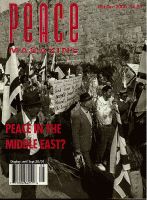
Peace Magazine Oct-Dec 2000, page 12. Some rights reserved.
Search for other articles by PMag staff here
A large concrete cross has stood outside St. Paul's Anglican Church in Toronto since 1931. In the centre of it has been a metal sword, a symbolic tribute to the war dead of the Queen's Own Rifles Regiment. It is a striking monument, but to the minds of devout believers in Christ's message of peace, love, and forgiveness, it is a sacrilege - a violation of the most sacred symbol of Christianity.
On Good Friday, 1999, therefore, Leonard Desroches, a Catholic layman who offers trainings in nonviolent resistance, Don Heap, an Anglican priest and former Member of Parliament, and Bob Holmes, a Catholic priest, came to St. Paul's with a number of supporters, intent upon removing the sword. They planned to have it converted into a ploughshare, in accordance with a prophetic verse of Isaiah, but instead they were arrested and charged with mischief.
They had anticipated the arrest, and indeed had publicized their action to draw public attention to the discrepancy between Christ's teachings and the secular legal tradition that upholds the ancient principle of the Just War. St. Augustine formulated that principle in the fifth century, an era when Christianity seemed to require armed defence from the barbarians threatening the Roman Empire.
According to Augustine's doctrine, it is morally correct to fight in a war under certain circumstances. The war itself must be waged for a just cause-to rectify injustices or restore stolen property to the rightful owners. The warrior's motives must be right also; hatred and revenge are excluded. The fighting must be commanded by a legitimate authority, who must not launch it until all other reasonable means have been tried. The methods must not be disproportionately destructive, and there must also be a good prospect of winning. Innocent people must not be the targets, nor may mass destruction be perpetrated against a population.
In recent years, many church leaders have argued that some modern instruments of warfare, such as nuclear, biological, and chemical weapons, must be rejected because they violate the Just War Doctrine. However, only a few churches - notably the Quakers and Mennonites - have disputed the doctrine itself, as do the men who sought to remove the sword from the cross.
At their trial in May they were allowed to make their case that, as Rev. Holmes said, "one of the most important teachings of Jesus Christ is to love your enemy. It is not possible to support war." This position was supported by the testimony of such religious leaders as Bishop Thomas Gumbleton of Detroit and, by letter, the former priest Philip Berrigan, who is serving time in a U.S. prison for bashing a fighter plane. Berrigan's letter stated, "Either Jesus was a liar or war is never necessary."
The judge recognized that the three defendants were motivated by high religious principles and, after finding them guilty, smiled and gave them an absolute discharge.

Peace Magazine Oct-Dec 2000, page 12. Some rights reserved.
Search for other articles by PMag staff here